
 |
|
The Man (2005) Cast: Samuel L. Jackson, Eugene Levy, Luke Goss, Miguel Ferrer, Anthony Mackie, Susie Essman, Gigi Rice, Horatio Sanz 2005 – 84 minutes Rated: Reviewed by Dustin Putman, September 7, 2005. 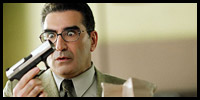 Dead-in-the-water from frame one, "The Man" is one of the most egregious entries in the never-ending buddy comedy genre in recent memory. Making 2004's similar Queen Latifah-Jimmy Fallon pairing, "Taxi," look almost good in comparison, the film is both bankrupt of fresh ideas and so desperately unfunny that the sound of pins dropping would be more ear-shattering than any laughs met by the would-be jokes.
Dead-in-the-water from frame one, "The Man" is one of the most egregious entries in the never-ending buddy comedy genre in recent memory. Making 2004's similar Queen Latifah-Jimmy Fallon pairing, "Taxi," look almost good in comparison, the film is both bankrupt of fresh ideas and so desperately unfunny that the sound of pins dropping would be more ear-shattering than any laughs met by the would-be jokes.
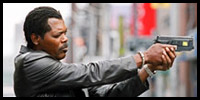 Pitting ultra-badass Samuel L. Jackson (2005's "Coach Carter") with nebbish character performer Eugene Levy (2003's "American Wedding") could have produced a comedic success with smart material, but not even the collective efforts of three screenwriters—Jim Piddock, Margaret Oberman, and Steve Carpenter (1999's "Blue Streak")—come up with but one or two smiles. For the most part, what they have concocted is painful and thankless, a waste of these two great actors' talents, a waste of the millions of dollars spent making it, and, even worse, a waste of the viewer's time. Simply put, there isn't a hint found onscreen of how or why "The Man" was greenlit and put into production.
Pitting ultra-badass Samuel L. Jackson (2005's "Coach Carter") with nebbish character performer Eugene Levy (2003's "American Wedding") could have produced a comedic success with smart material, but not even the collective efforts of three screenwriters—Jim Piddock, Margaret Oberman, and Steve Carpenter (1999's "Blue Streak")—come up with but one or two smiles. For the most part, what they have concocted is painful and thankless, a waste of these two great actors' talents, a waste of the millions of dollars spent making it, and, even worse, a waste of the viewer's time. Simply put, there isn't a hint found onscreen of how or why "The Man" was greenlit and put into production.
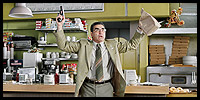 The plot hardly seems to be the point—indeed, there doesn't seem to be any point at all—but director Les Mayfield (2001's "American Outlaws") nonetheless insists on overcomplicating the plot for no reason. When Federal Agent Derrick Vann's (Samuel L. Jackson) partner is killed by a group of gun-running thugs led by Joey (Luke Goss), he arranges to finally catch them by going undercover as one of their clients. Vann's plans are foiled, however, when he is mistaken for Minnesota dental supply salesman Andy Fiddler (Eugene Levy), in Detroit to speak at a dentist's convention. With the arranged pick-up of a cell phone and gun at a diner leading Joey to believe Andy to be their man, Vann has no choice but to kidnap Andy and force him into playing along so that the criminals can be apprehended once and for all.
The plot hardly seems to be the point—indeed, there doesn't seem to be any point at all—but director Les Mayfield (2001's "American Outlaws") nonetheless insists on overcomplicating the plot for no reason. When Federal Agent Derrick Vann's (Samuel L. Jackson) partner is killed by a group of gun-running thugs led by Joey (Luke Goss), he arranges to finally catch them by going undercover as one of their clients. Vann's plans are foiled, however, when he is mistaken for Minnesota dental supply salesman Andy Fiddler (Eugene Levy), in Detroit to speak at a dentist's convention. With the arranged pick-up of a cell phone and gun at a diner leading Joey to believe Andy to be their man, Vann has no choice but to kidnap Andy and force him into playing along so that the criminals can be apprehended once and for all.
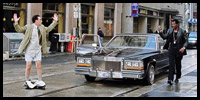 Light on charm, heavy on groans, and bereft of a single memorable scene, "The Man" runs just 80 minutes sans end credits and still feels interminably padded-out. Comedic set-pieces involving Andy's flatulence and his fish-out-of-water intermingling with the baddies are as moldy as month-old pizza left rotting under a dorm room bed, while a particularly outdated joke about the Spice Girls exposes the script to be one that has been drifting around Hollywood since 1997. It should have stayed that way. Only a scene in which Andy's money drop-off in a street corner garbage bin is intercepted by a bum in search of leftover food starts approaches being clever, and it is over and done with before the second act. Attempts at action, like the two inevitable car chases, fall just as flat by being filmed in a flat, boring fashion.
Light on charm, heavy on groans, and bereft of a single memorable scene, "The Man" runs just 80 minutes sans end credits and still feels interminably padded-out. Comedic set-pieces involving Andy's flatulence and his fish-out-of-water intermingling with the baddies are as moldy as month-old pizza left rotting under a dorm room bed, while a particularly outdated joke about the Spice Girls exposes the script to be one that has been drifting around Hollywood since 1997. It should have stayed that way. Only a scene in which Andy's money drop-off in a street corner garbage bin is intercepted by a bum in search of leftover food starts approaches being clever, and it is over and done with before the second act. Attempts at action, like the two inevitable car chases, fall just as flat by being filmed in a flat, boring fashion.
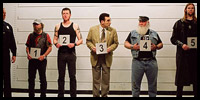 Performance-wise, this is not an example of one of Samuel L. Jackson's finer moments. As Agent Derrick Vann, Jackson is too hard-edged to be likable, and never softens enough to form any relationship with Andy other than one of contempt. As Andy, Eugene Levy is much better. His role is one he has played too many times to count—that of the offbeat, goofy, nerdy comic relief—but he excels at it when the material he has to work with matches his level of ability. When starring in something like 2003's "A Mighty Wind," Levy is brilliant. When here he is left hanging with nothing of worth to do and little of wit to say. Collectively, Jackson and Levy never click as the buddy film requires; then again, one could hardly call them buddies when all they do is bicker.
Performance-wise, this is not an example of one of Samuel L. Jackson's finer moments. As Agent Derrick Vann, Jackson is too hard-edged to be likable, and never softens enough to form any relationship with Andy other than one of contempt. As Andy, Eugene Levy is much better. His role is one he has played too many times to count—that of the offbeat, goofy, nerdy comic relief—but he excels at it when the material he has to work with matches his level of ability. When starring in something like 2003's "A Mighty Wind," Levy is brilliant. When here he is left hanging with nothing of worth to do and little of wit to say. Collectively, Jackson and Levy never click as the buddy film requires; then again, one could hardly call them buddies when all they do is bicker.
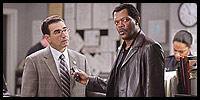 Evaporating from the viewer's mind as quickly as the images pass through the camera, "The Man" is tedious, grossly conventional tripe that even undiscriminating audience members will probably shrug off as feeble swill. Whoever thought what this picture had to offer was beneficial to the world of cinema, even as a silly throwaway comedy, would have been wise to rethink their intentions. "The Man" is silly and it is a throwaway, all right, but it also lacks charisma, comic verve, and a reason for existing.
Evaporating from the viewer's mind as quickly as the images pass through the camera, "The Man" is tedious, grossly conventional tripe that even undiscriminating audience members will probably shrug off as feeble swill. Whoever thought what this picture had to offer was beneficial to the world of cinema, even as a silly throwaway comedy, would have been wise to rethink their intentions. "The Man" is silly and it is a throwaway, all right, but it also lacks charisma, comic verve, and a reason for existing.
|
© 2008 by Dustin Putman |














